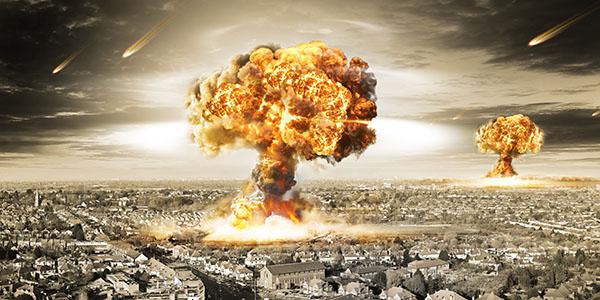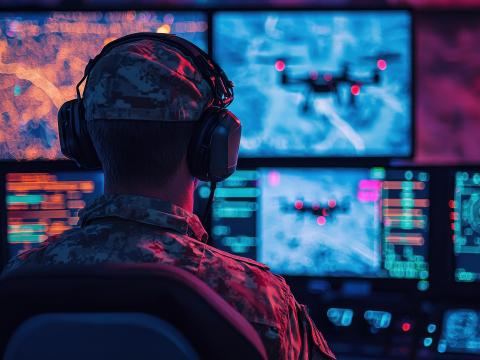Researchers Add Data Science to Art of Wargames
Later this month a team of researchers plans to release an online wargame that will use machine learning and data analytics to study nuclear conflict escalation and the strategic stability of nations in an artificial world.
The game is known as Strategic Interaction Game Between Nuclear Armed Lands (SIGNAL), which is not related in any way to SIGNAL Magazine. Developed by researchers from Lawrence Livermore National Laboratory (LLNL), Sandia National Laboratories (SNL), and the University of California, Berkeley, the game is described as a first of its kind. “This is the first time that someone has built an online platform to answer specific research questions and with the goal of collecting thousands of game outcomes for quantitative analysis,” says Andrew Reddie, the lead author of a recent Science Magazine paper and a research associate at LLNL’s Center for Global Security Research (CGSR).
More traditional wargaming studies, such as mathematical models or surveys can be useful, but they also leave knowledge gaps. “Ultimately, one of the things we’re really trying to address is the fact that some really important research questions for scholars of international security can’t be answered with observational data. There isn’t any,” Reddie asserts. “The thing the project is really trying to do is to test the viability of designing wargames as experiments rather than having wargames represent a one-off exploratory or educational experience for military planners or policy makers.”
The SIGNAL game combines big data science with the art of wargaming. “The professional wargaming community very much sees wargaming as an art rather than a science. We’re trying to ask if we can use wargaming for something beyond what it’s been used for thus far,” Reddie says.
He points out that wargames have been used for about 200 years to educate military members or to explore new strategies. “The major drawback of these wargames that have traditionally been described as an art is that they don’t allow for a large data set analysis because we’re carrying out a wargame on, say Vietnam, and another on Korea, and so you can’t aggregate out all those outcomes to get any sort of meaningful inference.”
SIGNAL was developed as part of the Project on Nuclear Gaming (PONG) and provides a flexible gaming environment that can be used to study a variety of research questions and simulate some aspects of warfare. PONG, led by the University of California, Berkeley, is one of a portfolio of Carnegie Corporation of New York-funded projects aimed at understanding the impact of emerging technologies on strategic stability and nuclear risk reduction, according to a UC Berkeley website.
The goals of the research project are threefold: to raise understanding of nuclear deterrence and conflict escalation with an eye toward better informed future analysis and debate; to generate insights into the conditions that might contribute to stability and instability in the context of nuclear weapons optimized for specific military objectives; and to develop game-based analytic and experimental tools for social science research.
The platform also allows for large, quantitative analysis of game outcomes in a multiplayer context, tracks demographic data and automatically collects data in real time. It will ultimately allow researchers to more fully investigate complex national security issues, Reddie states in an LLNL announcement.
The game is not built exclusively for policy makers. Anybody over the age of 18 can log in and play. The game is turn-based with three players or teams of different colors, orange, purple and green. They seek to achieve three particular victory conditions: to minimize the loss of territory, to garner the greatest number of resources and to build as much infrastructure as possible.
The game, which is hosted on Amazon Web Services servers, also proceeds in three rounds, a signaling round in which players signal their intent; an action round in which they act out their intent; and an upkeep round during which they count up their resources. Reddie emphasizes the importance and uniqueness of the signaling round. “Actually, that signaling phase is one of the key innovations of our game. With regards to nuclear questions, signaling credible commitment is really important,” he says. “One of the things the game architecture forces players to do is to make credible commitments to the other players around the board about what they’re going to do.”
Players also have military, economic and diplomacy tools at their disposal. They are scored relative to one another.
Besides the signaling data, the researchers collect and analyze data regarding actions taken and game results. “We’re looking ultimately to compare game outcomes across thousands of iterations, which is new. It’s an attempt to look at wargaming data for outcome-based conclusions,” Reddie explains. “We’re looking for player strategy sets that are trying to achieve particular win conditions. We’re looking at how they mix economic, military and diplomatic tools to pursue those goals set up.”
Reddie points out that the data is fully anonymous. “The unit of analysis for the project is the game itself. It’s not the player. And there’s no game data that gets tied explicitly to individual players. Also, obviously, all the actions the players take and all that data is anonymized.”
Once the online game is made available to the public, the researchers will begin to collect preliminary data to be presented at conferences. The first presentation will happen in March followed by another sometime this summer. “All of the data collection activity associated with this iteration of the game is due to wrap up in the fall of 2019 where then we will be making a determination about how we want to move forward,” Reddie says. Possibilities include taking on new research questions or using lessons learned about “critical junctures in the escalation ladder” to inform traditional tabletop exercises for play with senior policy makers.
The researchers have developed a traditional board game and a tabletop format in addition to the online game.





Comments